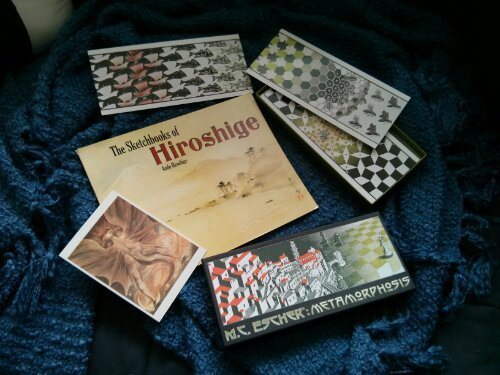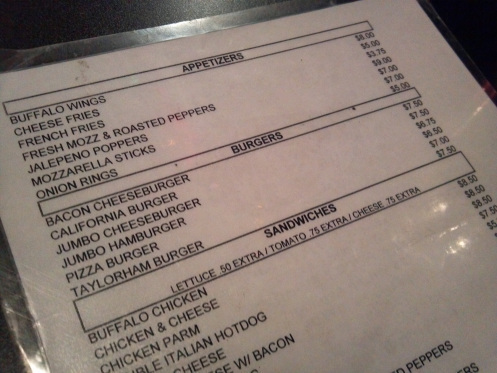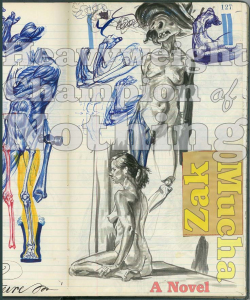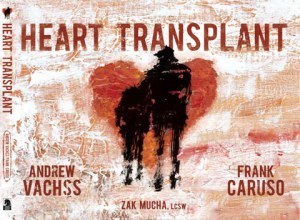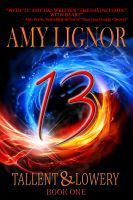Thomas Pluck's Blog, page 50
January 20, 2013
Unoppressive Non-Imperialist Bargain Books
My bookstore haul days are limited, now that Firecracker and I share a modest apartment. Despite my admiration for the ease of e-books- I wish every new book gave you an e-book download code, like many music and movies do- I love books for their design elements and other physical qualities that add up to more than the sum of their parts. I’d line the walls with shelves full of them if I could.
I visited Unoppressive Non-Imperialist Bargain Books on a walk through the West Village with Zak Mucha last week. They mostly sell remainders of class-conscious tomes, lots of books on Blake, Bob Dylan, President Obama, and so on. I picked up an art book of The Sketchbooks of Hiroshige to give me some visual inspiration for the short novel I am writing, which is set partially in Japan. I also snagged a box of greeting cards printed with portions of M.C. Escher’s mural “Metamorphosis.” I’ve always been fascinated with woodcuts, and Escher was my introduction to them. At the register, there was a stack of postcards with William Blake’s “The Red Dragon and the Woman Clothed in Sun,” which played a big part in one of my favorite novels, Red Dragon by Thomas Harris. For me, it was the first serial killer novel that delved into how we make our own monsters, treating him with sympathy but also firm in showing that true psychopaths cannot be rehabilitated, because they like what they do.
So that was my haul, for twenty bucks. Not bad. An interesting little book shop with a nice selection of books you might not find in a chain store, at bargain prices.
Tagged: bookstores, Hiroshige, Japan, M.C. Escher, New York City, Thomas Harris, William Blake, Zak Mucha



January 18, 2013
Fresh Kills: Krug’s Tavern Burger
I’ve waxed poetic about Krug’s Tavern before. This is my favorite burger. It is big. It is tasty and unpretentious. It is always cooked well so it is juicy yet has a char on the outside. It is twelve ounces of the American heartland stuffed in your mouth.
Krug’s has a history. This is a destination, not just a burger. The tavern was originally opened by boxer Jake LaMotta in 1938, and remains in his family. LaMotta was the subject of Raging Bull. And this is one raging bull of a burger. To the family’s credit, they keep a poster of Jake and don’t name menu items after him or the movie.
The bacon cheeseburger is $7.50 and is the size of four patties from Five Guys. And tastes even better. The fries are steak fries. The onion rings are perfect battered hoops of crunch. The pickles, the hot peppers given as appetizer also serve as my favorite toppings.
The bar is what you’d call an old man bar. Not a gastropub. They have Harpoon IPA on tap next to the Bud, but nothing craftier. The TVs show local sports. The stools are crammed with broad-shouldered men in work boots with their elbows on the scarred mahogany. The grill sizzles, the whiskey flows freely. It has atmosphere and attitude. A Chinese woman will pop in at lunch hour with a bag of bootleg DVDs. Across the street is Sassy Ass lingerie shop and up the block is Five Corners, the heart of “Down Neck,” or Ironbound as it is called these days.
This burger and the place that serves it is a prime cut from the heart of Newark, and year after year, it remains my favorite.
Tagged: Burgers, Fresh Kill, Krug's Tavern



January 17, 2013
Belly Up to the Bar with Zak Mucha
Zak Mucha is a therapist in private practice and the supervisor of an Assertive Community Treatment program, providing services to persons suffering severe psychiatric and substance abuse disorders in Chicago’s Uptown and Edgewater neighborhoods, and an advisory board member of the National Association to Protect Children. He is also the author of the novel THE BEGGARS’ SHORE, co-author of the bully-tackling graphic novel HEART TRANSPLANT with Andrew Vachss and Frank Caruso, and his short story “Community Reintegration” appears in Protectors: Stories to Benefit PROTECT. I had the pleasure of reading his upcoming novel HEAVYWEIGHT CHAMPION OF NOTHING, a gritty blue-collar tale of youth in Chicago. You can read an excerpt here.
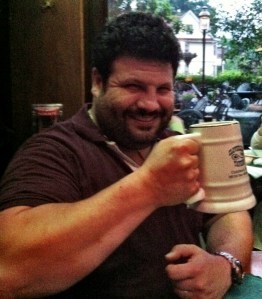 TP: You’re an LCSW, licensed clinical social worker. And from what I’ve read, it informs your writing in a profound manner. What led you to the profession, and what has the experience taught you most?
TP: You’re an LCSW, licensed clinical social worker. And from what I’ve read, it informs your writing in a profound manner. What led you to the profession, and what has the experience taught you most?
 ZM: I never in my life planned on being a social worker. The guys I hung out with through most of my life, no one thought much of social workers. I mean, really, that was someone you had to see only if you got caught. Social workers were never any type of role model, especially male role models. They’re still not.
ZM: I never in my life planned on being a social worker. The guys I hung out with through most of my life, no one thought much of social workers. I mean, really, that was someone you had to see only if you got caught. Social workers were never any type of role model, especially male role models. They’re still not.
What led me to this profession was I eventually accepted writing was not my profession. To keep writing, I was going to have to keep another job. Most of the jobs I’ve had have been manual labor. I would work a job for so many months and when I had enough money, or because it was seasonal work, I would lock myself in and write for a few months. I’d come out broke and have to get back to work. It’s a lousy and unintelligent way to live, but I did it because I wanted to write at the time…
But while I was jumping jobs, I tried a couple social service things. I had a vague idea I wanted to do something I was hesitant to call “meaningful” or “good.”
I didn’t go back to school for a Bachelors until after Beggars’ was published. So that book was published and I found myself still scrambling for a living. I tried a social service job, which was basically thug work in a juvie shelter for wards of the state. At the time I only had a high school diploma. I left quickly, but took several more years before I agreed with the idea that if I ever wanted any autonomy, I needed to get a college degree. At one point I was teaching writing in a women’s prison which was fun but really I wasn’t accomplishing much.
 TP: I really enjoyed HEAVYWEIGHT, which if I had to describe it, is about a young guy coasting along at a moving company, drifting into crime, avoiding responsibility for his mentally ill girlfriend and chronically ill father while figuring things out. You capture that aimlessness of extended adolescence, and the difficulty we have with owning our behavior at that age. And yet, the book is startlingly funny and tragic at the same time. The narrator is exploited throughout, by bosses, women and friends. What inspired the book?
TP: I really enjoyed HEAVYWEIGHT, which if I had to describe it, is about a young guy coasting along at a moving company, drifting into crime, avoiding responsibility for his mentally ill girlfriend and chronically ill father while figuring things out. You capture that aimlessness of extended adolescence, and the difficulty we have with owning our behavior at that age. And yet, the book is startlingly funny and tragic at the same time. The narrator is exploited throughout, by bosses, women and friends. What inspired the book?
 ZM: Being exploited is a part of it. By people in all three categories. The narrator has no blueprint to figure much out, does he? He bangs along. It’s a revenge fantasy, but I didn’t want to step away from reality when describing how a young man learns the rules of the world. I did work on moving trucks for a long time. The fictional content of the book is a little thin at some points.
ZM: Being exploited is a part of it. By people in all three categories. The narrator has no blueprint to figure much out, does he? He bangs along. It’s a revenge fantasy, but I didn’t want to step away from reality when describing how a young man learns the rules of the world. I did work on moving trucks for a long time. The fictional content of the book is a little thin at some points.
I saw a couple old pals the other night. We worked together for years. And for years I heard, “You should write a book about this place…” I was pleased that these guys understood it. They haven’t read the thing and they don’t need to.
 TP: In America, we tend to define ourselves by what we own and what we do, jobs and possessions. And movers get to touch everything we own. There are even packing services, where they box and wrap everything for you. Yet the job is almost treated with contempt, like it’s not for a grown man. The middle-class disdain for blue collar work. I only worked construction for a short time, but I felt it, a sort of paternalism. To a different extent, we see this with wait staff. For the duration of a meal, the middle class gets to rent the experience of having servants. Your book gets this.
TP: In America, we tend to define ourselves by what we own and what we do, jobs and possessions. And movers get to touch everything we own. There are even packing services, where they box and wrap everything for you. Yet the job is almost treated with contempt, like it’s not for a grown man. The middle-class disdain for blue collar work. I only worked construction for a short time, but I felt it, a sort of paternalism. To a different extent, we see this with wait staff. For the duration of a meal, the middle class gets to rent the experience of having servants. Your book gets this.
 ZM: If you’re ever stuck at a social gathering, that’s the general question: “What do you do?”
ZM: If you’re ever stuck at a social gathering, that’s the general question: “What do you do?”
Once a pal and I were working a moving job at a hospital… We were, at the moment, under a fume hood, trying to take it apart. Some doctor was talking to us. All we could see were his ankles. At one point the doctor said, “You seem like intelligent guys, why are you doing this work?” My pal under the hood with me actually owned the company.
My pal said, “Hold on. I’m going to look at your face when I answer you.” He got up and introduced himself.
The doctor introduced himself as Doctor Whatever.
My pal said, “No, what’s your Christian name?”
This felt real good. We weren’t going to accept his status.
Sure, if you’re doing the dirty work for a living, you feel the disdain. You end up having to really check yourself from assuming the disdain is always there. This is why I wanted the introduction on crime and narcissism included in the book.
How you treat the people doing the dirty work says a lot about you. Do you take grief all day at work and wait until there’s a barista to sneer at? Or do you get that huffy and entitled with your boss, too?
Waiters, they have a rough job. They have to take such an egregious amount of crap from people. Of course, the potential for vengeance is huge. Any waitress I knew had awful stories about what happens to meals ordered by rude customers.
Of course, it would be more honorable for the waitress to take her complaint right to the customer. But, say you need the job because you have kids. Or if you have a mountain of school loans (the only loans you cannot bankrupt out of—the owner of the restaurant, he can walk away from debt, but his waitstaff paying for school cannot) your choices are limited. The power dynamic is right there. While the customer feels his behavior is justified because he can pay for the meal, the waiter loses her job for defending herself.
 TP: I bused tables ran a factory cafeteria at night, and my mother waited tables at a country club a while, so I know that first hand as well. It’s a form of tolerated bullying. I found your work through HEART TRANSPLANT, the graphic novel you collaborated on with Andrew Vachss and Frank Caruso. One of the messages in the book is that you can’t lose by fighting back, and the way the Gent teaches this to his young charge is ingenious. I wish I’d gotten the same lesson, but it’s not for everybody. The tough problem with bullying, as I see it, is that we reward aggression. We need a certain amount of aggressiveness, as ambition and competition, but in America, success absolves all sins. If there were an easy solution- like “teach everyone that protecting those weaker than you is the true test of adulthood” we’d have done it. Is there any good first step we can take in schools, or at home, start changing things for the better?
TP: I bused tables ran a factory cafeteria at night, and my mother waited tables at a country club a while, so I know that first hand as well. It’s a form of tolerated bullying. I found your work through HEART TRANSPLANT, the graphic novel you collaborated on with Andrew Vachss and Frank Caruso. One of the messages in the book is that you can’t lose by fighting back, and the way the Gent teaches this to his young charge is ingenious. I wish I’d gotten the same lesson, but it’s not for everybody. The tough problem with bullying, as I see it, is that we reward aggression. We need a certain amount of aggressiveness, as ambition and competition, but in America, success absolves all sins. If there were an easy solution- like “teach everyone that protecting those weaker than you is the true test of adulthood” we’d have done it. Is there any good first step we can take in schools, or at home, start changing things for the better?
 ZM: If you mean aggressiveness as a means of self-defense, sure, we do need that. The lesson is for everybody, but it also had to be presented differently to different people. One guy may have no trouble defending himself from a physical threat. But an emotional threat gets right through his gloves. He was never taught to recognize that as an attack, much less how to defend himself from it.
ZM: If you mean aggressiveness as a means of self-defense, sure, we do need that. The lesson is for everybody, but it also had to be presented differently to different people. One guy may have no trouble defending himself from a physical threat. But an emotional threat gets right through his gloves. He was never taught to recognize that as an attack, much less how to defend himself from it.
I’ve been doing workshops on emotional self-defense ever since Heart Transplant came out. Changing the culture is about confrontation. Confrontation is uncomfortable. The slogans – hell check Facebook – are useless at best and offensive at worst.
A lot of the anti-bullying stuff isn’t working because the message, “Don’t be a bully, be nice to other people,” is being thrown at kids (and adults) who have already developed a lack of empathy for others. And every time that person is not challenged on their behavior, that lack is more and more calcified, as well as justified in their own minds.
Once empathy is clearly absent, we can’t infuse it into a person. But we can teach people it’s going to cost them if they try to hurt others. I’ve given workshops where the teachers are burnt out and they’re telling me to tell kids, “Don’t fight,” while I’m also seeing which kids are totally intimidating the teachers and the class without ever throwing a punch.
There are a lot of people who will gladly protect others in a heartbeat, but have a very hard time protecting themselves.
The lessons of emotional self-defense are simple. But they go against the cultural grain. It’s true that the measure of a person is whether they protect others, but before they can truly do that, they have to be able to recognize when they themselves are in pain and be able to defend themselves.
 TP: Chicago is a city with a soul, but it’s a stranger to me. It has its own flavor of corruption, its own blues, and a rough history going back to the stockyards. I was there for a business trip once, I only had time to go to the Billy Goat, the top of the Hancock building, and speed down Lower Wacker Drive. Were you born there, and what keeps you there?
TP: Chicago is a city with a soul, but it’s a stranger to me. It has its own flavor of corruption, its own blues, and a rough history going back to the stockyards. I was there for a business trip once, I only had time to go to the Billy Goat, the top of the Hancock building, and speed down Lower Wacker Drive. Were you born there, and what keeps you there?
 ZM: I’ve considered leaving it a lot of times. I have left it a few times. The only reason I would leave again is to be with the people I love. They don’t live here. That’s the only reason I would leave.
ZM: I’ve considered leaving it a lot of times. I have left it a few times. The only reason I would leave again is to be with the people I love. They don’t live here. That’s the only reason I would leave.
I was born here. I like the history of the city, but that’s becoming such a distant memory across the whole city. You drive through and try to remember what used to be on this block or that block. But you can still go to the IWW office and see Joe Hill’s urn. You can see some decent boxing matches. My pal, Ric Addy, DJs the fights. He also sings in a country punk band and runs a fine bookshop. I can go out and see Jon Langford and Sally Timms, Kelly Hogan, and Freakwater singing in bars. I hardly do that as much as I’d like, though.
The city itself is changing. The team I run during the day, part of our job is to help clients who are at the very bottom of the socioeconomic barrel. People who are frequently homeless, psychotic, drug-addicted — housing for them is disappearing. There’s a real push to get “those people” out of the neighborhood. I want to ask: Didn’t you see them when you moved in? They were here first. For decades, our neighborhood has, historically, been the shunt valve for the state and private mental hospitals.
The first book I wrote, Beggars’ Shore, was about this same crowd in Uptown. I was not a social worker then, I hadn’t even gone to college, but I was living in this neighborhood and I don’t think it’s a coincidence I ended up back here, working with this population. What I wanted to do with that book — make some sort of change – was *never* going to happen with that book. But it does happen with the ACT team I run. Writing a book is easier. You can fix your mistakes the following day and there’s no damage. I’ve had days on the job where I knew I wasn’t going home until I found a place for this psychotic person to sleep. And then when I got home, I would get called out again for someone else’s crisis. We’re on-call 24/7.
 TP: You have a career, where hopefully you can see some small mark you leave on the world. You help people, or at least attempt to, on a daily basis. So, what drives you to write? You have a strong voice, so I hope you have more books in you.
TP: You have a career, where hopefully you can see some small mark you leave on the world. You help people, or at least attempt to, on a daily basis. So, what drives you to write? You have a strong voice, so I hope you have more books in you.
 ZM: If I have any drive to write, it’s really not fiction. Maybe years down the road if I retire from one of the jobs I have… But Heavyweight Champion of Nothing is marking the end of one life for me.
ZM: If I have any drive to write, it’s really not fiction. Maybe years down the road if I retire from one of the jobs I have… But Heavyweight Champion of Nothing is marking the end of one life for me.
Maybe because I’ve found a couple other jobs that have a real importance to me, offer me some opportunity to change things on maybe a couple levels, I have less interest in writing fiction.
I don’t think the shift in my writing goals is coincidental.
There’s non-fiction I’m working on right now, one thing with Marc MacYoung.
 TP: MacYoung, like Andrew Vachss, has written things which changed my life. With Vachss it was “You Carry the Cure in Your Own Heart,” where he broke the taboo about emotional abuse. It’s not macho to admit that works “cut sharper than knives,” as INXS so succinctly put it. And MacYoung, he taught me that all my MMA training, weapons katas, stress fire target shooting at the range was trying to fight the fear within myself. It had become a cold shadow following me, the fear of being attacked, or not being able to protect my loved ones. And I think a lot of men have that fear with them, like that Zimmerman guy who shot Trayvon Martin. A lot of people are defending him, that’s how common the fear is. Whether the media drives it, or the NRA, or politicians. All three. Can you tell us a little about what you and Marc are working on, because I will be first in line.
TP: MacYoung, like Andrew Vachss, has written things which changed my life. With Vachss it was “You Carry the Cure in Your Own Heart,” where he broke the taboo about emotional abuse. It’s not macho to admit that works “cut sharper than knives,” as INXS so succinctly put it. And MacYoung, he taught me that all my MMA training, weapons katas, stress fire target shooting at the range was trying to fight the fear within myself. It had become a cold shadow following me, the fear of being attacked, or not being able to protect my loved ones. And I think a lot of men have that fear with them, like that Zimmerman guy who shot Trayvon Martin. A lot of people are defending him, that’s how common the fear is. Whether the media drives it, or the NRA, or politicians. All three. Can you tell us a little about what you and Marc are working on, because I will be first in line.
 ZM: Marc and I are working on a book about what to do in situations or relationships where people are not following social scripts. This one is not a physical self-defense book, but more about how to keep a situation from building to violence. In conversation Marc and I found we had a lot of the same ideas. The fear you’re describing is a part of it—we’re looking at how we use our own responses to assess a situation and how to possibly triage our own families.
ZM: Marc and I are working on a book about what to do in situations or relationships where people are not following social scripts. This one is not a physical self-defense book, but more about how to keep a situation from building to violence. In conversation Marc and I found we had a lot of the same ideas. The fear you’re describing is a part of it—we’re looking at how we use our own responses to assess a situation and how to possibly triage our own families.
Marc’s a guy who’s been through a lot. He doesn’t need any more violence to prove he’s a man. He gets it that whatever fear we have, we put it on someone not like ourselves. We provoke them and then use that to justify our behavior. I’m having fun writing this book. This might be the only book I’ve enjoyed writing, but that would be because of Marc.
 TP: In writer interviews, they always ask what authors are your influence, but especially our generations, I think everything from music, movies, TV and video games counts. I’m gonna ante up, one of my favorite crime novels is Prowlers, by your Chicago native Eugene Izzi. What would you say your influences are?
TP: In writer interviews, they always ask what authors are your influence, but especially our generations, I think everything from music, movies, TV and video games counts. I’m gonna ante up, one of my favorite crime novels is Prowlers, by your Chicago native Eugene Izzi. What would you say your influences are?
 ZM: Reading and writing were more insufficiently masculine activities, like being a social worker… You didn’t want to get caught doing such things. I had one high school teacher, a man named Jerry Stefl, who could see through me, so he’d slip books to me, knowing I would resent any assignments or instructions. This same teacher ended up getting me a scholarship to an art school. All the deadlines were past, and this being Chicago, I imagine he called on some sort of marker.
ZM: Reading and writing were more insufficiently masculine activities, like being a social worker… You didn’t want to get caught doing such things. I had one high school teacher, a man named Jerry Stefl, who could see through me, so he’d slip books to me, knowing I would resent any assignments or instructions. This same teacher ended up getting me a scholarship to an art school. All the deadlines were past, and this being Chicago, I imagine he called on some sort of marker.
I lasted about a minute in art school. I had no clue what I was doing. I remember sitting and drinking with a couple guys who were talking about their trust funds. One guy’s dad owned a newspaper, the other a record company. I thought they were putting me on. “There’s no such thing as a trust fund…” But while I was skipping classes, I hung out in the library. I grabbed everything I could, whether I understood it or not.
 TP: I don’t know if it began with Reagan, or after Geraldo Rivera exposed the abuse at the Willowbrook mental institution, but I think we treat the majority of mental illness, especially violent cases, as a criminal justice issue instead of a medical one. As someone on the front lines, can you give us a picture from your turf, and tell us what we should seek for reform?
TP: I don’t know if it began with Reagan, or after Geraldo Rivera exposed the abuse at the Willowbrook mental institution, but I think we treat the majority of mental illness, especially violent cases, as a criminal justice issue instead of a medical one. As someone on the front lines, can you give us a picture from your turf, and tell us what we should seek for reform?
 ZM: Persons with mental illnesses have been treated horrifically since the start of time. A Google search would give you more information than you could ever want.
ZM: Persons with mental illnesses have been treated horrifically since the start of time. A Google search would give you more information than you could ever want.
I’ve talked to enough people with really violent and psychotic plans. It’s scary because it is not an argument you’re going to win with logic.
A small percentage of cases do become criminal issues. But those cases get such a disproportionate amount of coverage. The program I supervise, we’re almost too late. We’re trying to minimize damage and get people back onto some kind of track after the system has already failed them.
The really vital points of intervention would be much earlier in a person’s life. And only recently are people starting to discuss trauma as a factor in psychotic disorders. For a long time, psychotic disorders were seen as genetic. That’s a part of it, but trauma is a factor. Makes sense — trauma threatens all perceptions of the world and how a person lives in the world. Psychosis is an inability to define the boundaries of the self: What’s me, what’s the outside world, and where do I make that boundary? Think of that and look at emotional abuse – where the abuse demands the victim change their sense of self, diminish the self in order to appease the aggressor. The brain tries to defend itself, but when a person’s perception of themselves is challenged and the person’s perception of reality is challenged inescapably, then the sense of self becomes more and more fragile.
There are really limited resources for outreach programs. I wrote a piece about the shooting in Aurora, Colorado, where I suggested somebody heard his plans. Later, we all learned that he definitely did explain he wanted to hurt people.
We need to have a system that can triage adolescents as they move into adulthood.
We need a system that will provide intensive services to that adolescent and young adult population – and have it be more than just warehousing in a psychiatric nursing home.
We really need a residential program to handle cases that need more services than an ACT program could provide. We need ones specifically designed for young adults – there’s a real different set of goals there as compared to working with a more middle-aged population with chronic psychotic symptoms.
If anyone wants to argue about the cost to the taxpayer, then they should also justify the cost of ignoring the problem like in Sandy Hook, Virginia Tech, or Aurora, Colorado.
 TP: We tend to think of violence as a force of nature, like there is no way to prevent it. It’s easier that way. The quarterly massacres we’ve come to endure as commonly as yearly hundred-year storms have put gun control, mental illness and gun culture into the conversation. I hope we treat mental illness properly within our lifetimes, but I have a feeling we’ll be discussing the same issues fifty years from now. Thanks for coming by and giving us a lot to think about. I think my readers will enjoy HEAVYWEIGHT CHAMPION OF NOTHING as much as I did.
TP: We tend to think of violence as a force of nature, like there is no way to prevent it. It’s easier that way. The quarterly massacres we’ve come to endure as commonly as yearly hundred-year storms have put gun control, mental illness and gun culture into the conversation. I hope we treat mental illness properly within our lifetimes, but I have a feeling we’ll be discussing the same issues fifty years from now. Thanks for coming by and giving us a lot to think about. I think my readers will enjoy HEAVYWEIGHT CHAMPION OF NOTHING as much as I did.
Tagged: Mental Illness, PROTECT, Protectors Anthology, Psychology, Violence, Writers, Zak Mucha



January 15, 2013
The Grand Illusion
Christopher Fowler thinks crime fiction has lost the plot. That means “has gone over the edge,” or “lost it,” for us on this side of the Atlantic. The gist of it is that most private investigators don’t work murder cases, and most crimes, even murders, go unsolved. And he is correct.
The basic premise of the detective or mystery story has been properly pegged as the return to order from chaos. And the second law of thermodynamics states the opposite: that in any closed system, disorder (entropy) always increases with time. This is discomforting. Making order from chaos has the opposite, palliative effect. And that is why we enjoy mystery stories on a visceral level. Some kind of justice being done. It is soothing, in an increasingly unjust world.
Does this put all crime fiction in the genre of fantasy? No. Not all crime fiction follows the same structure. Read Tana French’s The Woods. Or some noir, though the loser getting squished like a cockroach is simply the cruel hammer of cosmological justice landing on someone who dares step outside his station, so in some ways noir is the most conservative subgenre of all. Some mysteries are best unsolved. They are mundane. Serial killers are still terrifying as psychopathic predators, but when you strip away their fetishes and rituals, they are all the same, damaged little children who had the empathy tortured out of them in one way or another.
This was the subject of my flash fiction story “The Uncleared.” It struck a nerve, and is one of my most popular stories. The justice is left to the mind of the reader, but feels as inevitable as the arrow of time. The law has failed, but justice will be done. This is the beginning of a novel, but I like it on its own as well. The thrills and gore and terror that will follow are all artifice, smoke and mirrors for what you already know, that justice can never be had. You can’t bring back the dead. To kill the pain inside you, you must become immune to pain. You know who doesn’t feel pain? Psychopaths.
So do I think all crime fiction is wishful thinking, because it doesn’t mirror reality? No. If I wanted reality, I can read the newspaper. Some stories do mimic the real world. Sometimes an episode in one’s life is like a story. Those often become memoirs. Because a “story” is also a construct meant to give comfort. They are often circular. They have familiar peaks and descents, the “rising action” which leads to… climax. And the good old afterglow, the denouement and the epilogue, which leaves us yearning.
Stories are all about verisimilitude. The semblance of reality. Just enough that we believe your cockamamie story, whether it’s about sparkly vampires, flying cars, someone having an epiphany about life, or a dogged police officer who won’t stop pulling at threads even if it means her life will fall to pieces as she puts one more unsolved case to rest. But I get what Fowler is talking about. I find myself more interested in the victims of crime and how they deal with it than seeing the cop fight the red tape, or the conspiracy, or the monolithic crime syndicate.
“The Uncleared” is based on a true story. A cousin of mine, she decided to become a real estate agent and sell her old house. Her husband found her in the basement bludgeoned to death. Her murder was never solved, but a killer with a similar M.O. was operating in the area and imprisoned. Another friend of mine, his mother was also murdered. The killer confessed in court, but due to a technicality, walks free among us. In a crime novel, my friend would plot the man’s demise, in a fiendishly clever manner that kept him out of jail. In reality, he has to live with it. And in some ways, that fascinates me more than any clever revenge plot. I can’t imagine living with it, but of course, I would. Life, like time’s arrow, goes only forward. It goes on. A gripping story could be written about it. Probably by John Irving. And I would like it.
But I also like stories such as Todd Robinson’s “Baby Boy” in Protectors: Stories to Benefit PROTECT. That is also based on a true story. We know how the story ends in reality, but Todd does what a writer is supposed to do. He gives it his own ending, one that is infinitely more thrilling. I don’t think Todd has “lost the plot,” nor have dozens of other crime fiction authors operating today. Sure, CSI and many police procedurals solve more crimes in fiction than have been cleared in the annals of history. But that’s a matter of taste. There are plenty of open-ended tales out there, ones that make for a satisfying read and have enough verisimilitude to not make us balk, even if we’re well read in true crime and unsolved cases. So while I agree with Mr. Fowler that neatly solved mysteries are not my cup of tea, I don’t think the genre has lost the plot or even recycled it ad nauseam. It’s all a matter of who you read.
Tagged: A Twist of Noir, Christopher Fowler, Todd Robinson



January 8, 2013
SSIMHTW: Weekend Irish by Barleyjuice
The Song Stuck In My Head This Week is… “Weekend Irish,” by Barleyjuice.
My grandfather came over on the boat from Bray, in County Wicklow. Other than inheriting his shillelagh, I regret not talking to him more about our heritage. By the time I was old enough, he was mostly in his cups, and we did little more than watch pro wrestling together.
Later, I got into the Pogues and I still like trad Irish music and Celtic rock. Barleyjuice is such a band from Philly, and this is one of their best songs. It gets stuck in my head quite often.
Their mp3 album The Barleyjuice Irish Collection is an incredible bargain, 32 songs for $8.99, and I quite enjoy it. Time to loop it and get this song out of my head.
Tagged: Barleyjuice, Ireland



January 7, 2013
Mystery or Crime Fiction? Less Filling.
Both Patti Abbott and Spinetingler editor Brian Lindemuth (at Do Some Damage) have asked whether you prefer Mysteries or Crime Fiction, both as a reader, and a writer, when it comes to labeling books.
It used to be that Crime Fiction was a subset to Mystery, and now the tables seem to be turning somewhat. Here is my long comment at DSD.
Almost every story has an element of mystery. What happens next? Parker is on a bridge and he tells a guy off. I like this guy. What’s he gonna do next? But that’s not a story of deduction. Is Tana French’s excellent Faithful Place allowed to be crime fiction? There’s a murder and we don’t know who did it. But her depiction of Dublin and her excellent characters are right out of Hammett or Chandler.
I like both mysteries and crime fiction. I consider Lawrence Block’s Bernie Rhodenbarr “Burglar” mysteries to be cozies. I can never keep up with the classifications that nerds keep narrowing down, whether it’s in music (no dude, that’s not shoegaze, it’s um, darkwave fartsniff dubstep!) or books or whatever. I can’t be bothered.
Let’s face it, Mystery and Crime Fiction are labels to sell a book. If it bothers you to see “Mystery” on a book you like, is it because you imagine Miss Marple or Jessica Fletcher and don’t want to be associated with fans of those stories?
Mystery lovers likely get the same shiver when they see Crime Fiction or Noir on a label, they know there may be foul language and testicles (probably severed ones).
It’s a marketing construct. I don’t like either label. “Crime Fiction” can certainly drive away readers who assume it’s all about serial killers and gumshoes wearing fedoras and talking like Bogart, just like “Mystery” may be dismissed as a puzzler to keep you occupied in the waiting room for the gastroenterologist.
What about “Suspense”? I hope your story has suspense, even if it’s “literary fiction.” But heavens forfend it be labeled a “thriller,” those are for reading on airplanes, right? Speaking of thrills, I’m thrilled when an author I like is in the good old Fiction section. Megan Abbott, Pete Dexter, Scott Phillips are all recent sightings. But I don’t mind wandering to the Mystery corner, like the “Adult” section of the video store (if you remember those) to get my kicks.
Like Colson Whitehead says about those who call genre fiction a guilty pleasure:
“Other people’s labels. Other people’s hang-ups.”
Tagged: Brian Lindemuth, Colson Whitehead, Do Some Damage, Genre, Lawrence Block, Megan Abbott, mystery, Patti Abbott, Pete Dexter, Scott Phillips, spinetingler magazine, Thrillers



January 3, 2013
Django Unbrained
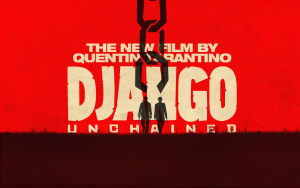
Quentin Tarantino’s DJANGO UNCHAINED is disappointing, enjoyable, tedious, wonderful, and naive all at the same time.
No movie is judged on its own merit. Like any artistic work, it is compared to everything that has come before it, and depending on when you encounter it, you pit it against what has come after it as well. Tarantino loves pastiche, homage, reference and remix, so his work seeks these judgments. And his latest falls short from what we’ve come to expect. It is overlong and indulgent, it is too alike his last film in some ways, and it lacks tension in its big mushy middle, but some scenes are magical, especially to fans of garish exploitation films and spaghetti westerns like myself. It will remind his detractors of the interminable bar scene in Death Proof at its worst, and the clipped action will tease us until the very end.
Django, played by Jamie Foxx, is the prisoner of slave traders when Dr. King Schultz–a German dentist turned bounty hunter, played by Christoph Waltz–frees him because he can identify three fugitives Schultz wants to collect. Yes, he is named Dr. King. He plays the Samaritan, most often played by an older black man or person of color in other films, the “magical Caucasian,” if you will, to Foxx’s hero. If you’re unfamiliar with the “magical negro” character, think Scatman Crothers in The Shining. He helps our hero for no good reason, against his own self-interest, and is usually killed for his trouble, often sacrificing himself for the protagonist’s cause. Waltz plays that character, drawing deep from the well he used to create the memorable “Jew Hunter” Hans Landa in Inglourious Basterds.
And while it is great fun watching Foxx become a bad-ass bounty hunter under Schultz’s tutelage, Waltz and his long-winded, fifty-cent word monologues lack the tension of Landa’s, because despite his crack marksmanship and disregard for the lives of vicious slavers, he is too good. We know exactly how he will react in a given situation, after we are introduced to how he collects his bounties. Which is to shoot first, then pull out his badge and papers, and say hey I’m working for the Federal government and if you shoot me, you’ll be in trouble. It was funny the first time, but seemed very unlikely, two years before the country was torn apart by secession and civil war, that anyone would give a tinker’s damn. And it gets less believable when Django plays his valet in full Lord Fauntleroy regalia, and later fakes being an Uncle Tom slaver assisting Schultz in purchasing a “Mandingo fighter,” or black bare-knuckle pit fighter, in their overly complicated and most likely unnecessary ruse to free Django’s wife.
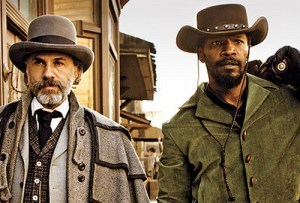
I love Blazing Saddles, and I’ve seen and enjoyed Fred Williamson‘s film about a bad-ass black sheriff leading a frontier town, Boss Nigger. Fred Williamson always had such screen presence that you never questioned how he became a sheriff in the west, or a commando in World War 2, as in the original The Inglorious Bastards. Foxx manages the same, but the plot keeps making excuses for him to be there. And the thing is, there was at least one black Federal marshal in the 1800′s, Bass Reeves (thanks to David Cranmer and his Cash Laramie tales for introducing me to this oft-forgot hero). It is not until the very end that Jamie Foxx gets to be a bad-ass, and by then, in a two hour and 45 minute movie, we’ve endured the longest dinner scene I’ve ever encountered, all so Leonardo DiCaprio can chew the scenery as supposedly, the most evil plantation owner ever. And he doesn’t even scratch the surface of the reality of chattel slavery, which is what bothered me. He makes men fight to the death, he has one torn apart by dogs. Brutal scenes, but “slavery” remains a word in this movie, not the horror that it was. This letter evokes more than Django Unchained managed.
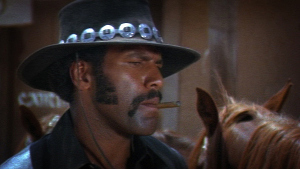
Fred Williamson in Boss, an obvious reference
Much has been said about the permissive use of the n-word in this film, and Tarantino has said before that “shouting words like this from the rooftops” rob them of their power, so I won’t go into it. It was repeated to a tiresome degree for me. I find it lazy when a villain uses racial slurs to make us hate him. DiCaprio’s Mr. Candie is revolting enough without it. For me, seeing this at a dinner theater staffed by African-American ushers and waiters, it was particularly uncomfortable, especially when it was not once used with any power. Blazing Saddles did more damage to the power of the word “nigger” than Tarantino has. Should he have censored himself? No, but he should have used his n-words more wisely. He uses “fuck” like a poet, but this word he stumbled with.
Now that I’ve torn the movie a new hole, let me say that the references to the original Django and the westerns and “blaxploitation” films of the ’70s are enjoyable, Jamie Foxx should make a black western and play it completely straight, like Fred Williamson did, and I’d go see it in a heartbeat. I’ll watch Django Unchained again on cable and let it simmer. I didn’t like Inglourious Basterds that much on my first viewing, but love it now. I don’t think any number of viewings will make the dinner between Foxx, Waltz, DiCaprio and Samuel L. Jackson playing an evil, Uncle Tom majordomo will ever be enjoyable. It’s the little things, like taking your guns to the dinner table, that don’t make sense, especially when you have a Taxi Driver-style derringer up your sleeve. And that Kerry Washington as Broomhilda gets very little to do. Django calls his love “troublemaker,” but we never see her raise any hell. In a 3 hour movie, there was plenty of time.
3/5 stars.
Other movies I’ve seen recently that are more fun than Django are:
The Grey, with Liam Neeson. A grisly meditation on icy death, this may be Joe Carnahan’s best.
Headhunters, based on Jo Nesbo’s thriller. Lots of fun, even if no one gets beheaded.
Savages, by Oliver Stone, adapted from Don Winslow’s excellent novel. Stop watching after the first ending. The second one is a not-so-subtle middle finger from Stone to the studio and focus groups, and changes the book’s finale.
And two to avoid: Sushi Girl, a horrible, boring, torture movie with a great cast, and Les Miserables, which might be fun for fans of the musical, but was awful for someone who’s read the unabridged book and had to listen to Russel Crowe destroy Javert while mimicking a statue. It had moments, but was so static and lifeless in so many places that I didn’t feel a thing. That, and whatever lives in Tim Burton’s hair seems to have bitten Helena Bonham Carter.
Tagged: Blaxploitation, Blazing Saddles, Christoph Waltz, Django Unchained, Fred Williamson, Headhunters, I'm Black and I'm Proud, Jamie Foxx, Kerry Washington, Les Miserables, Magical Negro, Quentin Tarantino, Samuel L. Jackson, Savages, Sushi Girl, The Grey, Westerns



January 2, 2013
The Verbs – Burnt Out Star
The Verbs are a favorite local band. I heard “Burnt Out Star” on Little Steven’s Underground Garage a year or so ago, and bought their album Trip because I enjoyed it so much. I imagine Jay Desmarteaux cruising around to it after he maxed out of Rahway, in the Challenger he takes from one of the men he did time for.
You can listen to more of their songs on their website, but their Facebook page is better for getting news. I hope to see them play sometime soon.
Tagged: The Verbs



January 1, 2013
First 5 of 2013: Buy Protectors, Get the Book of Your Choice
The first 5 readers to buy Protectors: Stories to Benefit PROTECT this year will get a surprise: a copy of the book of their choice.
You will have to email me the receipt at goombahgumbo AT gmail DOT com (replace the AT with @ and the DOT with . of course)
The book must be in print and not a crazy special edition. If you buy the e-book in any form, you get an e-book of your choice. Trade paperback, and you get a print edition of your choice. It’s as simple as that. You’ll need to supply your address to mail the book to. Physical books will be purchased through Amazon. If that bothers you, buy the print edition through Watchung Booksellers, and I’ll buy your book through them.
Links to all retailers who carry the book are listed here.
If you don’t want a book, I will make a donation to PROTECT in your name for the purchase price of the book. Of course, all proceeds from your purchase go to PROTECT anyway, so this is like a donor match.
And to encourage you to share this link, if you post it to Twitter, add the hashtag #Protectors5 and I will donate $1 to PROTECT for every time it is posted. On Facebook, it is more difficult to count shares, but if you share the link from my profile HERE I will donate $1 for each share. Share, don’t “like,” please. Same goes for reblogs. If you use the share buttons at the bottom of the post, I should see the counts.
Thank you for all your help. We’ve already raised more in two months than the first book did in six. It’s a great success. Let’s keep it rolling.
Tagged: Giveaways, Protectors Anthology



Interview with Amy Lignor in The Big Thrill
In this issue of The Big Thrill, I interview author Amy Lignor about her conspiracy-adventure through history, “13,” which begins in the New York Public Library. The first in her new Tallent & Lowery series, fans of the DaVinci Code take note. Lignor is the author of a the young adult series The Angel Chronicles, and the book sounds like a blast for those of us who like forgotten history and ancient conspiracies. This one’s got Jack the Ripper, Aleister Crowley, and a lot more.
Read the interview here at The Big Thrill.
Tagged: 13, Amy Lignor, Interviews, The Big Thrill, Thrillers



Thomas Pluck's Blog
- Thomas Pluck's profile
- 122 followers


